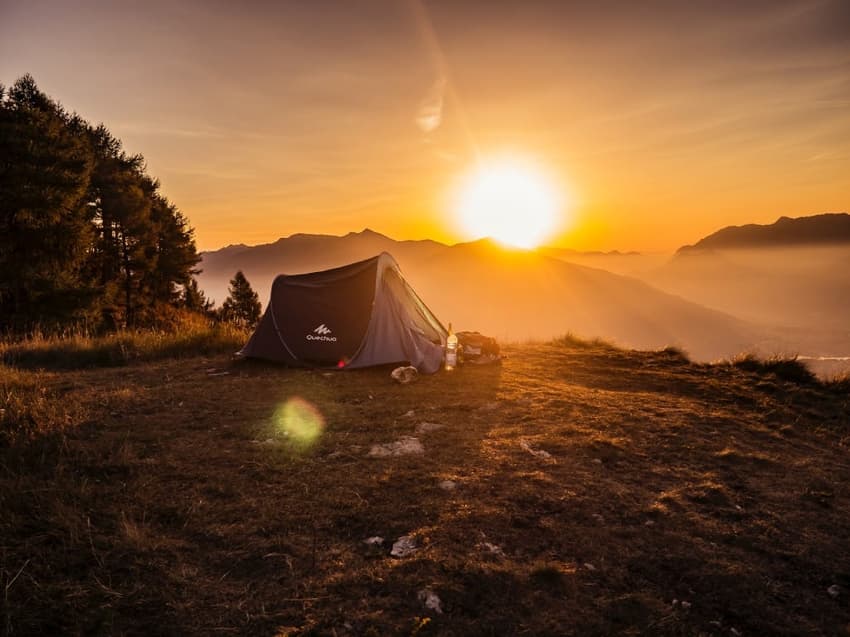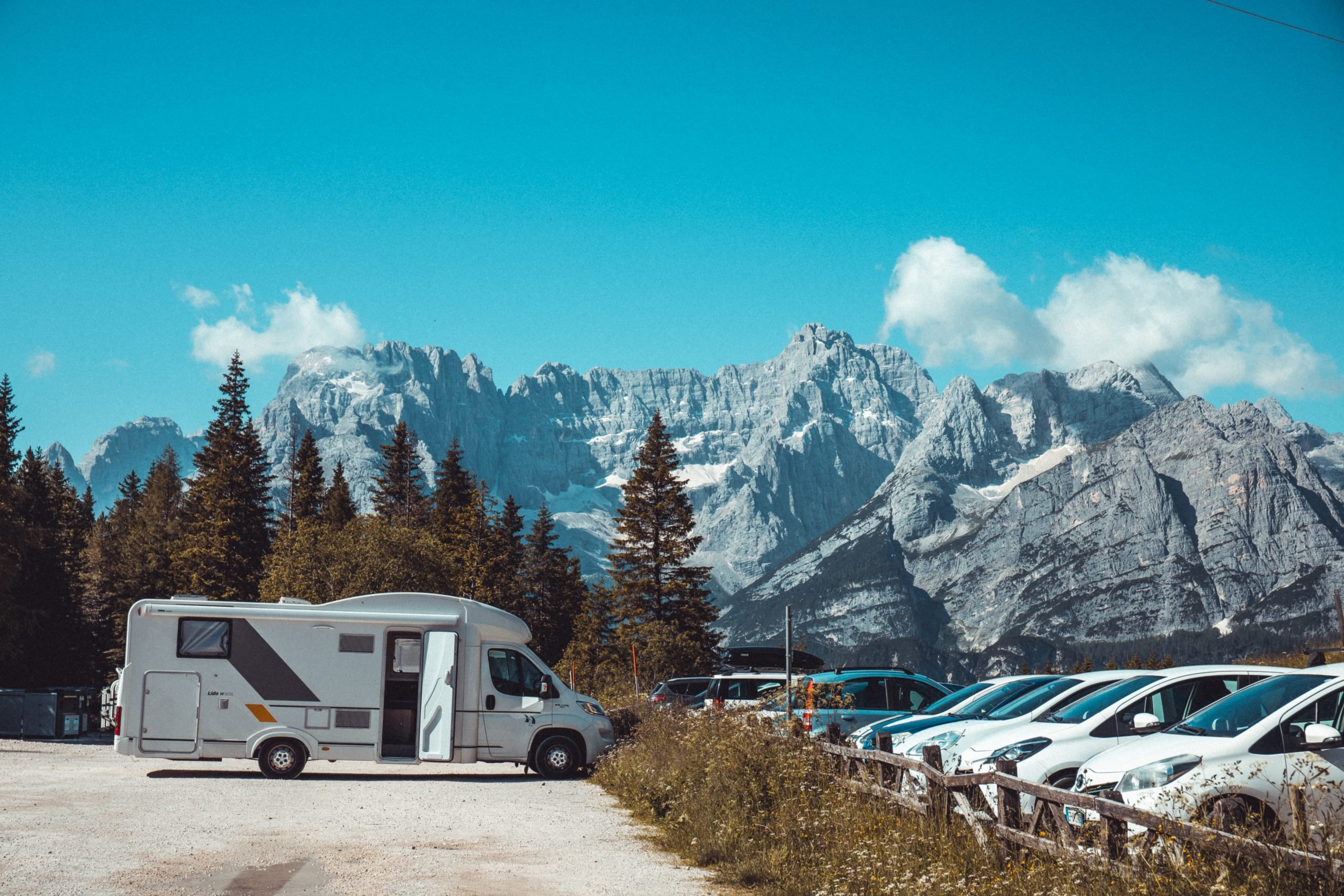What are the rules on wild camping in Italy?

Is it ever possible to camp outside of officially designated campsites in Italy? Read on to find out the rules and restrictions on where you can and can't camp along the peninsula.
It’s the ultimate Italian camping holiday dream, setting up your tent right on the beach or in a deserted pine forest and waking up to spectacular views, all to yourself.
But is this even possible or legal? Are you actually allowed to camp or sleep in open fields or on mountainsides or beaches in Italy?
The short answer is...not really.
Simply showing up to an unmarked spot and staking your tent is generally prohibited in Italy, and could land you with a fine of anywhere between €100 and €500.
The situation is complicated, however, by the fact that each of the country's 20 regions have their own rules governing wild camping, ranging from the very strict to the moderately lenient.
What do the rules say?
Firstly, it's important to know that there's a legal difference between wild camping and bivouacking.
The former is just camping outside of an equipped camping area, while the latter entails setting up some kind of makeshift camp (with or without a tent) at dusk and leaving around sunrise the next day, staying for no more than a few hours. In some situations where wild camping is banned in Italy, you're still allowed to bivouac.
Don't assume, though, that saying you're bivouacking will get you out of a fine if you're found by a park ranger or policeman: in many instances, you also need to get permission to bivouac before setting off.
READ ALSO: How to choose a camping holiday in Italy: A guide for the uninitiated
In some regions, both wild camping and bivouacking is occasionally allowed, but you'll need to familiarise yourself with local rules to make sure you're staying on the right side of the law.
If your aim in wild camping is to save money rather than to spend a night on a deserted mountaintop, there are less picturesque alternatives available.
Sicily and Abruzzo, for example, allow local municipalities to create designated (unserviced) parking lots where campers can stay for free for a fixed period of time; while asking private individuals for permission to stay on their property is another - often surprisingly effective - option.
Regardless of region, you can expect to find universal bans on wild camping on beaches or in built up areas in towns and cities.

In some parts of Italy you can camp in designated parking lots. Photo by Anders Nielsen on Unsplash
How do the rules vary between regions?
Some regions, like Sardinia, Veneto and Friuli Venezia Giulia, have a blanket ban on camping outside of campsites.
Others, like Basilicata and Lazio, say the decision is up to local municipalities, to whom would-be wild campers have to make a written request. If permission is granted, you can camp in Lazio for up to 15 days in the same spot (Basilicata doesn't specify a time limit).
Trentino Alto Adige allows bivouacs for a period of no more than 24 hours in areas where they are not explicitly prohibited by the competent local authorities (e.g., all of Sud Tyrol's national parks have a blanket ban). Val d'Aosta allows bivouacking above 2,500m, but not in Gran Paradiso National Park or nearby any existing shelters such as mountain refuges (rifugi).
Some regions don't appear to have any regulations on wild camping; in these cases it's safest to email the local council (comune) of the place where you're planning on staying to seek permission.
READ ALSO: How much more expensive is it to holiday in Italy this summer?
For information on what each region says about wild camping, the lawyer Claudia Cimato has compiled a detailed list of the relevant regulations in each Italian region, which the website of the outdoor gear store Bergzeit has sorted into a helpful summary and table (in Italian).
Is it worth trying to wild camp at all in Italy?
If you're a foreign tourist, probably not. You'll need good Italian to make a request to the local authorities and decode their answer, and you'll need to have your route mapped out well in advance.
For those coming on holiday to Italy from abroad, then, you're probably best off booking a pitch at an official campsite.
If you're a keen camper based in Italy and speak good Italian, however, exploring the option of wild camping might be worth the effort.
You might assume that a request to a local authority doesn't stand the slightest chance of getting an answer - but that's not necessarily the case.
The travel and camping blogger Simona Scacheri says she's obtained permission to wild camp and bivouac by asking ahead, and particularly recommends a site along the Grande Traversata Elbana on Tuscany's Elba Island, as well as the Via Degli Abati and the Asiago plateau.
READ ALSO: MAP: Which regions of Italy have the most Blue Flag beaches in 2023?
You'd also be surprised how willing other private landowners are to let you camp on their land in exchange for a nominal fee or donation, or simply an agreement that you'll patronise their facilities (e.g., go to the restaurant of an agriturismo if you're camping on their land).
The writers behind the Novo-Monde travel blog say that on their wild camping trips across Europe they've never once been turned down when they've asked to stay on someone's private land, so it's always worth asking!
In sum, plan well ahead, prepare to move on regularly, and don't be timid about asking - when it comes to wild camping in Italy, fortune favours the brave.
Comments
See Also
It’s the ultimate Italian camping holiday dream, setting up your tent right on the beach or in a deserted pine forest and waking up to spectacular views, all to yourself.
But is this even possible or legal? Are you actually allowed to camp or sleep in open fields or on mountainsides or beaches in Italy?
The short answer is...not really.
Simply showing up to an unmarked spot and staking your tent is generally prohibited in Italy, and could land you with a fine of anywhere between €100 and €500.
The situation is complicated, however, by the fact that each of the country's 20 regions have their own rules governing wild camping, ranging from the very strict to the moderately lenient.
What do the rules say?
Firstly, it's important to know that there's a legal difference between wild camping and bivouacking.
The former is just camping outside of an equipped camping area, while the latter entails setting up some kind of makeshift camp (with or without a tent) at dusk and leaving around sunrise the next day, staying for no more than a few hours. In some situations where wild camping is banned in Italy, you're still allowed to bivouac.
Don't assume, though, that saying you're bivouacking will get you out of a fine if you're found by a park ranger or policeman: in many instances, you also need to get permission to bivouac before setting off.
READ ALSO: How to choose a camping holiday in Italy: A guide for the uninitiated
In some regions, both wild camping and bivouacking is occasionally allowed, but you'll need to familiarise yourself with local rules to make sure you're staying on the right side of the law.
If your aim in wild camping is to save money rather than to spend a night on a deserted mountaintop, there are less picturesque alternatives available.
Sicily and Abruzzo, for example, allow local municipalities to create designated (unserviced) parking lots where campers can stay for free for a fixed period of time; while asking private individuals for permission to stay on their property is another - often surprisingly effective - option.
Regardless of region, you can expect to find universal bans on wild camping on beaches or in built up areas in towns and cities.

How do the rules vary between regions?
Some regions, like Sardinia, Veneto and Friuli Venezia Giulia, have a blanket ban on camping outside of campsites.
Others, like Basilicata and Lazio, say the decision is up to local municipalities, to whom would-be wild campers have to make a written request. If permission is granted, you can camp in Lazio for up to 15 days in the same spot (Basilicata doesn't specify a time limit).
Trentino Alto Adige allows bivouacs for a period of no more than 24 hours in areas where they are not explicitly prohibited by the competent local authorities (e.g., all of Sud Tyrol's national parks have a blanket ban). Val d'Aosta allows bivouacking above 2,500m, but not in Gran Paradiso National Park or nearby any existing shelters such as mountain refuges (rifugi).
Some regions don't appear to have any regulations on wild camping; in these cases it's safest to email the local council (comune) of the place where you're planning on staying to seek permission.
READ ALSO: How much more expensive is it to holiday in Italy this summer?
For information on what each region says about wild camping, the lawyer Claudia Cimato has compiled a detailed list of the relevant regulations in each Italian region, which the website of the outdoor gear store Bergzeit has sorted into a helpful summary and table (in Italian).
Is it worth trying to wild camp at all in Italy?
If you're a foreign tourist, probably not. You'll need good Italian to make a request to the local authorities and decode their answer, and you'll need to have your route mapped out well in advance.
For those coming on holiday to Italy from abroad, then, you're probably best off booking a pitch at an official campsite.
If you're a keen camper based in Italy and speak good Italian, however, exploring the option of wild camping might be worth the effort.
You might assume that a request to a local authority doesn't stand the slightest chance of getting an answer - but that's not necessarily the case.
The travel and camping blogger Simona Scacheri says she's obtained permission to wild camp and bivouac by asking ahead, and particularly recommends a site along the Grande Traversata Elbana on Tuscany's Elba Island, as well as the Via Degli Abati and the Asiago plateau.
READ ALSO: MAP: Which regions of Italy have the most Blue Flag beaches in 2023?
You'd also be surprised how willing other private landowners are to let you camp on their land in exchange for a nominal fee or donation, or simply an agreement that you'll patronise their facilities (e.g., go to the restaurant of an agriturismo if you're camping on their land).
The writers behind the Novo-Monde travel blog say that on their wild camping trips across Europe they've never once been turned down when they've asked to stay on someone's private land, so it's always worth asking!
In sum, plan well ahead, prepare to move on regularly, and don't be timid about asking - when it comes to wild camping in Italy, fortune favours the brave.
Join the conversation in our comments section below. Share your own views and experience and if you have a question or suggestion for our journalists then email us at [email protected].
Please keep comments civil, constructive and on topic – and make sure to read our terms of use before getting involved.
Please log in here to leave a comment.